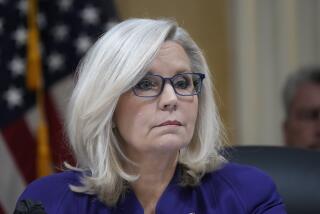Cheney Is Adamant on Iraq ‘Evidence’
- Share via
WASHINGTON — Vice President Dick Cheney revived two controversial assertions about the war in Iraq on Thursday, declaring there was “overwhelming evidence” that Saddam Hussein had a relationship with Al Qaeda and that two trailers discovered after the war were proof of Iraq’s biological weapons programs.
The vice president stood by positions that others in the Bush administration have largely abandoned in recent months, as preliminary analysis of the trailers has been called into question and new evidence -- including a document found with Hussein when he was captured -- cast doubt on theories that Iraq and Al Qaeda collaborated.
Cheney’s comments were seen as stoking the controversy over Iraq as the vice president was embarking on a trip to an economic summit in Switzerland and meetings with European officials, some of them fierce opponents of the war who have been dismissive of U.S. claims about the threat posed by Iraq.
Cheney has consistently espoused the most hawkish views among senior administration officials. His statements Thursday suggest he intends to maintain that tone as he takes a more high-profile role in President Bush’s reelection campaign.
“There’s overwhelming evidence there was a connection between Al Qaeda and the Iraqi government,” Cheney said in an interview on National Public Radio. “I am very confident that there was an established relationship there.”
That assertion appeared at odds with the recent words of other senior administration officials, including Secretary of State Colin L. Powell, who said in an interview this month that he had “not seen smoking-gun, concrete evidence” of connections between Iraq and Al Qaeda.
Danielle Pletka, an analyst at the conservative American Enterprise Institute, defended Cheney’s comments, saying he referred only to a “relationship” between Iraq and Al Qaeda.
“Nobody has ever said Saddam directed Al Qaeda in attacks,” Pletka said. “But it is clear that had he decided to do so at any point it would have been easy.”
Members of Congress and some in the intelligence community said Thursday that Cheney’s comments could lead the public to believe there was collaboration between Iraq and Al Qaeda, and that that was not supported by the evidence.
U.S. intelligence officials agree that there was contact between Hussein’s agents and Al Qaeda members as far back as a decade ago and that operatives with ties to Al Qaeda had at times found safe haven in Iraq. But no intelligence has surfaced to suggest a deeper relationship, and other information turned up recently has suggested that significant ties were unlikely.
Sept. 11 mastermind Khalid Shaikh Mohammed, who is in custody, has told American interrogators that Al Qaeda rejected the idea of any working relationship with Iraq, which was seen by the terrorist network as a corrupt, secular regime. When Hussein was captured last month, he was found with a document warning his supporters to be wary of working with foreign fighters.
“There’s nothing I have seen or read that backs [Cheney] up,” said Sen. John D. “Jay” Rockefeller IV (D-W.Va.), vice chairman of the Senate Select Committee on Intelligence, who called Cheney’s remarks Thursday “perplexing.”
Cheney also argued that the main thrust of the administration’s case for war -- the claim that Iraq was assembling weapons of mass destruction -- had been validated by the discovery of two flatbed trailers outfitted with tanks and other equipment.
“We’ve found a couple of semi-trailers at this point which we believe were in fact part of [a WMD] program,” Cheney said. “I would deem that conclusive evidence, if you will, that he did in fact have programs for weapons of mass destruction.”
That view is at odds with the judgment of the government’s lead weapons inspector, David Kay, who said in an interim report in October that “we have not yet been able to corroborate the existence of a mobile [biological weapons] production effort.”
In a BBC interview that aired Thursday night on public television in the United States, Kay said that is still the case. He said it was “premature and embarrassing” for the CIA to conclude shortly after the vehicles were discovered last year that they were weapons labs. “I wish that news hadn’t come out,” Kay said, calling the release of the information a “fiasco.”
Experts are still in disagreement over the purpose of the vehicles, with some saying they may have been meant for biological weapons production and others saying it was more likely they were meant for making hydrogen.
Cheney is considered the administration official who has the most influence with Bush. His role in assembling the case for war has been controversial.
His numerous trips to CIA headquarters before the war were interpreted by some critics as an effort to pressure agency analysts to adopt hard-line views. In his public appearances, he often cast the alleged threat from Iraq in a harsh light, warning that United Nations inspectors could not be effective and that Iraq had reconstituted its nuclear program. Kay has since said there was no active nuclear program.
Since the war, as the administration has sought to deflect charges that it exaggerated the Iraqi threat, Cheney has appeared reluctant to give ground. On occasion, this has created public relations problems for the White House.
After Cheney implied in a television interview in September that Iraq was involved in the Sept. 11 attacks, Bush was forced to acknowledge days later that the administration “had no evidence that Saddam Hussein was involved” in Sept. 11.
The White House had no comment Thursday on Cheney’s remarks.
Citing Cheney’s latest comments, Democrats on Capitol Hill renewed their calls for an examination of the administration’s use of intelligence.
“This is the same problem that existed before the war. Leaders are going beyond what the intelligence community said,” said Sen. Carl Levin (D-Mich.).
The intelligence committees in the House and Senate are nearing completion of reports on intelligence failures in Iraq, but Republican leaders have resisted calls for examinations of claims made by officials in the executive branch.
Cheney insisted the “jury is still out” on whether Iraq had weapons of mass destruction when the U.S. invaded last year. He said the search for banned arms should continue there.
“It’s going to take some additional, considerable period of time in order to look in all the cubbyholes and the ammo dumps and all the places in Iraq where you might expect to find something like that,” Cheney said.
Bush has staunchly defended his decision to go to war, but has had to adopt somewhat strained language to characterize the threat he says was posed.
With no weapons of mass destruction yet discovered, Bush in his State of the Union address Tuesday said the United States had evidence of “weapons-of-mass-destruction-related program activities.”
More to Read
Get the L.A. Times Politics newsletter
Deeply reported insights into legislation, politics and policy from Sacramento, Washington and beyond. In your inbox twice per week.
You may occasionally receive promotional content from the Los Angeles Times.










